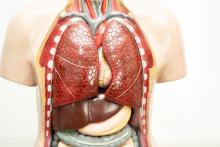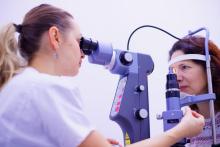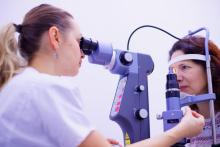Recent Publications

Raed Salim: Extending the time limit of the second stage of labor versus delivering on time operatively. A retrospective cohort study J Obstet Gynaecol Can .)
To analyze the effect of extending the second-stage on maternal outcomes compared to not exceeding the time at the expense of 100% operative delivery.

Orsan Yahya, Sana Bisharat: Factors Influencing Exclusive Breastfeeding Amongst Arab Mothers in Israel: Social, Cultural, and Occupational Aspects (Healthcare (Basel) .)
Exclusive breastfeeding (EB), feeding an infant solely breast milk, has been recommended worldwide due to its health benefits for infants and mothers. However, EB rates remain low, due to several socio-demographic, occupational, and cultural factors. Objectives: Our aim was to investigate the factors associated with EB amongst Arab mothers living in Israel, i.e., age, education, religiosity, employment status, and the number of children which impact breastfeeding practices.

Raed Salim: A systematic review and meta-analysis of randomized controlled trials on the effects of internal iliac artery balloon occlusion in placenta previa and placenta accreta spectrum in reducing perioperative bleeding (Int J Gynaecol Obstet .)
Preoperative prophylactic balloon occlusion (PPBO) of internal iliac arteries (IIAs) in placenta previa and placenta accreta spectrum (PAS) has been widely used as a preventive adjuvant technique to reduce blood loss and to preserve fertility. Nevertheless, the efficacy of PPBO is based primarily on retrospective studies.

Nasser Sakran: Meta-analysis of randomized controlled trials for the development of the International Federation for Surgery of Obesity and Metabolic Disorders-European Chapter (IFSO-EC) guidelines on multimodal strategies for the surgical treatment of ob
Full title: Meta-analysis of randomized controlled trials for the development of the International Federation for Surgery of Obesity and Metabolic Disorders-European Chapter (IFSO-EC) guidelines on multimodal strategies for the surgical treatment of obesity (Diabetes Obes Metab.)
.)

Mariana Boulos, Rabia S Mousa, Nizar Jeries, Elias Simaan, Klode Alam, Bulus Bulus, Nimer Assy: Hidden in the Fat: Unpacking the Metabolic Tango Between Metabolic Dysfunction-Associated Steatotic Liver Disease and Metabolic Syndrome (Int J Mol Sci . )
Metabolic syndrome (MetS) and metabolic dysfunction-associated steatotic liver disease (MASLD) are closely related, with rapidly increasing prevalence globally, driving significant public health concerns. Both conditions share common pathophysiological mechanisms such as insulin resistance (IR), adipose tissue dysfunction, oxidative stress, and gut microbiota dysbiosis, which contribute to their co-occurrence and progression. While the clinical implications of this overlap, including increased cardiovascular, renal, and hepatic risk, are well recognized, current diagnostic and therapeutic approaches remain insufficient due to the clinical and individuals' heterogeneity and complexity of these diseases. This review aims to provide an in-depth exploration of the molecular mechanisms linking MetS and MASLD, identify critical gaps in our understanding, and highlight existing challenges in early detection and treatment.

Mitochondrial translocator-protein ligand etifoxine reduces pain symptoms and protects against motor dysfunction development following peripheral nerve injury in rats (Neuropharmacology . )
Peripheral nerve injury enhances mitochondrial translocator protein (TSPO) expression in the spinal cord and dorsal root ganglia (DRG), which is associated with neuroinflammation and mitochondrial dysfunction contributing to chronic pain development. Here, we investigate the effect of TSPO ligand Etifoxine, on the development of chronic pain and motor dysfunction following sciatic nerve injury.
(Yaseen Awad-Igbaria, Reem Sakas, Lama Milhem, Tom Fishboom, Aviv Ben-Menashe,Jean F Soustiel, Eilam Palzur)

Alon Gorenshtein, Kamel Shihada, Liron Leibovitch, Tom Liba: The association between migraine and gut microbiota: a systematic review (Acta Neurol Belg . )
Recent studies suggest a link between gut microbiota and neurological diseases, implicating the microbiome's role in neurological health. However, the specific alterations in the microbiome associated with migraine remain underexplored. This study aims to systematically review the existing literature to determine whether migraine patients are associated with changes in gut microbiota composition.

Khalaf Kridin: Dupilumab shows no elevated risk for maternal adverse pregnancy outcomes: A propensity-matched cohort study (J Eur Acad Dermatol Venereol . )
Type 2 chronic inflammatory diseases (T2IDs) are highly prevalent among women of reproductive age. Dupilumab, a monoclonal antibody, is increasingly used to treat T2IDs. While dupilumab is not approved during pregnancy, smaller studies suggest no increased risk of pregnancy complications (adverse pregnancy outcomes (APOs)). Additional data are required to better assess the drug's safety during pregnancy. Objectives: To retrospectively assess the risk of APOs in dupilumab-treated pregnant women in a large real-world database.

Edo Y Birati: Outcomes following isolated right ventricular assist device as durable support for primary right heart failure: An INTERMACS analysis (JHLT Open . )
Outcomes with isolated right ventricular assist devices (iRVAD) using pumps designed for the left ventricle are not well described. This study compares the clinical characteristics and outcomes of iRVAD patients to those patients treated with left ventricular assist device (LVAD) and biventricular assist devices (BiVAD).

Rola Khamisy-Farah, Raymond Farah, Rabie Shehadeh, Inshirah Sgayer Shannan, Corinne Topchi, Yara Moallem, Basem Hijazi: Knowledge, Perceptions, and Attitudes of Israeli Healthcare Professionals Toward Mpox: A Survey-Based, Cross-Sectional Study (Healthcar
Mpox, a zoonotic viral disease, has recently emerged as a significant global public health challenge. Historically confined to endemic regions in West and Central Africa, recent outbreaks in non-endemic areas have highlighted the critical role of healthcare professionals (HCPs) in disease management and prevention.

Yuval Cohen, Yehuda Greenberger, Aviv Vidan, Otzem Chassid: The Association Between Refraction, Ocular Biometry, and a Child's Behavior Assessed by Conners' Parental Rating Scale (Clin Ophthalmol .)
Examines the association between refraction, ocular biometry and a child's behavioral disorder using the Conners' Parent Rating Scale.

Raymond Farah, Tammy Jacoby, Rola Khamisy-Farah: Neutrophil-to-Lymphocyte Ratio, C-Reactive Protein, and Mean Platelet Volume in Differentiation of Ascites Causes (Isr Med Assoc J .)
Ascites is a product of fluid accumulation within the peritoneal cavity. Underlying etiologies include cirrhosis, congestive heart failure (CHF), nephrotic syndrome, and malignancies. Patients with cirrhotic ascites are at increased risk for infections, especially spontaneous bacterial peritonitis (SBP), which is associated with high rates of morbidity and mortality. Ascites is diagnosed both clinically and sonographically. SBP is diagnosed via abdominal paracentesis, a relatively safe and effective procedure. However, abdominal paracentesis carries risks such as bleeding, bowel perforation, and infection. Objectives: To identify new inflammatory markers as alternative or replacement methods for accurately evaluating patients before and after abdominal paracentesis and how these new inflammatory markers can be evaluated from a simple, inexpensive, and routinely performed blood sample.

Sivan Spitzer: Israel should build capacity in implementation science (Isr J Health Policy Res .)
Implementation Science (IS) is a scientific discipline that has been in existence for approximately thirty years. The goal of this discipline is to develop and refine rigorous approaches to producing change in the health system, and thereby to shrink the quality gap between best practice and current practice more quickly and more completely than could occur through naturalistic change alone.





